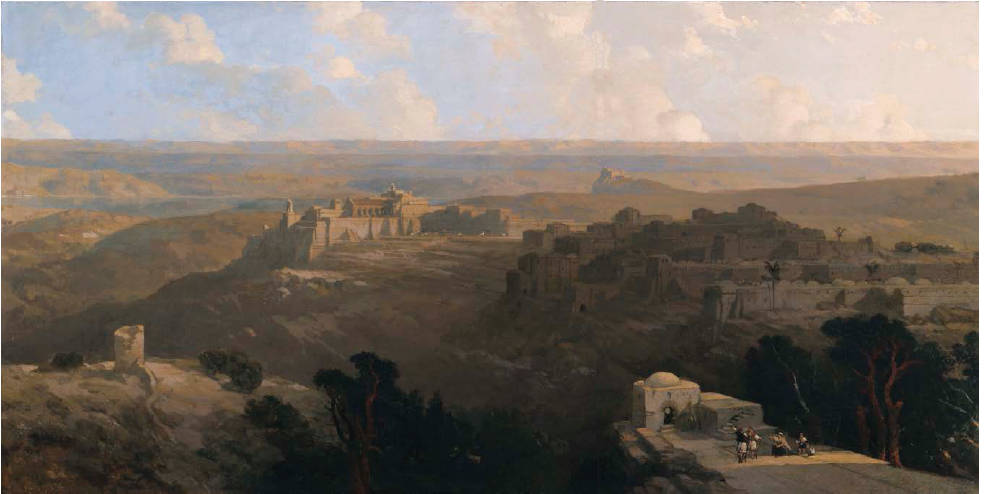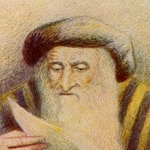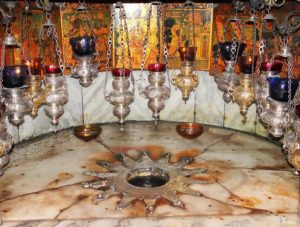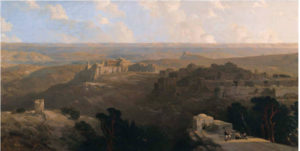Micah’s Unique Bethlehem Prophecy
Prophecies throughout the Scriptures foretell many things about the Messiah, but only one prophecy foretells the location from where he would come forth – Bethlehem Ephrathah.[1]
Micah 5:2 “But you, Bethlehem Ephrathah, Though you are little among the thousands of Judah, Yet out of you shall come forth to Me The One to be Ruler in Israel, Whose goings forth are from of old, From everlasting.” –New King James Version
Translations of the Micah prophecy in the Jewish and Greek Bibles are in harmony in English translations, although in almost all Jewish Bibles, the prophecy appears one verse earlier:
Micah 5:1 But thou, Beth-lehem Ephrathah, which art little to be among the thousands of Judah, out of thee shall one come forth unto Me that is to be ruler in Israel; whose goings forth are from of old, from ancient days.” – Jewish Publication Society[2]
Micah 5:2 And thou, Bethleem, house of Ephratha, art few in number to be reckoned among the thousands of Juda; yet out of thee shall one come forth to me, to be a ruler of Israel; and his goings forth were from the beginning, even from eternity.” – Septuagint LXX [3]
Hebrew text translation of Micah’s prophecy that does not explicitly say Mashiach (Hebrew for “Messiah”) opening the door to controversy over its meaning. One noteworthy exception is the Targum Jonathan, the Aramaic Talmud translation, which uses the word Mashiach, :[4]
“Out of thee Bethlehem shall Mashiach go forth before me, to exercise dominion over Israel. Whose name has been spoken of Old from the day of Eternity.” – Targum Jonathan
Counterviews, in essence, contend the future ruler of Israel would possess no messianic qualities, some argue the “ruler of Israel” refers to a future general or that Bethlehem Ephrathah refers to a family clan, not a town location. Others claim the meaning of the “days of old” and “ancient times” refers to the golden area of David’s reign some 300 years earlier and even a few go so far as to say Targum Jonathan was mistranslated.[5]
All sides agree this is a prophecy about a future ruler of Israel who will come from the lineage of David. Barring mis-stranslation, the controversy hinges on one of two scenarios: would the future ruler come forth from the physical location of Bethlehem Ephrathah OR is he merely a descendant from the Biblical family clan, the firstborn son of Ephrathah named Bethlehem?[6]
Detractors of the prophecy foretelling the town is the birth location of the Messiah are lined up against some very highly respected Jewish sages. Comments by Rabbi Rashi, highlrevered as a Jewish sage on the Talmud Mishnah, appear in The Complete Jewish Bible with Rashi Commentary:[7]

“And you, Bethlehem Ephrathah”: [Rashi:] whence David emanated, as it is stated (I Sam. 17:58): “The son of your bondsman, Jesse the Bethlehemite.” And Bethlehem is called Ephrath, as it is said (Gen. 48:7): “On the road to Ephrath, that is Bethlehem.”
“from you shall emerge for Me”: [Rashi:] the Messiah, son of David, and so Scripture says (Ps. 118:22): “The stone the builders had rejected became a cornerstone.”
“and his origin is from of old”: [Rashi:] “Before the sun his name is Yinnon” (Ps. 72:17).
Rashi specifically identified the future ruler of Israel as “the Messiah, Son of David.” He also commented, the name “Yinnon” (Yinon) has been his name since “before the sun.”
Talmud Nedarim 39b says the name of the Messiah has existed before the world and the Sun and shall endure forever.[8] Sanhedrin 98b identifies Yinnon along with Shiloh and other names for the Messiah (Moshiach) along with a quote from the Isaiah 52-53 parashah, considered by many to be a Messiah prophecy, too.[9]
Medieval era Rabbi David Kimchi (Kimhi or Radak) is highly regarded by Jewish authorities for his written comments in the margins of the Torah 1347 edition, The Prophets.[10] A translation of Kimchi’s commentary on the Micah prophecy said:[11]
“And this is King Christ and it means to be you avoided in the cities of thousands of young Judah now against them and though yes from you Christ came to me because of David’s seed. Who was from Bethlehem will be and that is what he said and his origins promoted from the world because the origins of the Messiah at that time would say that a long time ago were from Bethlehem it is David because there is a long time between David and the King of Christ and it is to him that he was from ancient times…”
Nazareth was the expected birthplace of Jesus and it appeared nothing was be able to change that – except for a Roman Caesar. Months in the making, the decree of Augustus announced by the Town Crier set in motion the birth of Jesus in Bethlehem 90 miles away.
King Herod’s expert Jewish religious council of chief priests and scribes believed Micah’s prophecy foretold the future “King of the Jews” or Christos would come forth from the location of Bethlehem Ephrathah. Joseph and Mary were also temporarily in Bethlehem…where Jesus was born.
According to Matthew, the Magi did indeed find Jesus in Bethlehem and worshiped the child. Meanwhile, Herod sought to kill the baby Jesus.
Further evidence of a special status for Bethlehem is found earlier in the Book of Micah. A contemporary prophet to Isaiah, Micah prophesied judgment of utter destruction for 10 towns or cities by name in the land of Abraham that would experience God’s wrath – Bethlehem was not one of them.[12]
If Micah’s prophecy foretells the Messiah would come from Bethlehem Ephrathah, was the birth of Jesus in Bethlehem a fulfillment of this prophecy?
Updated December 31, 2024.
This work is licensed under a Creative Commons Attribution-NonCommercial-NoDerivatives 4.0 International License.
REFERENCES:
[i] Killian, Greg (Hillel ben David). “Bethlehem – Beit Lechem – The House of Bread.” Betemunah.org. n.d. <http://www.betemunah.org/bethlehem.html> “Bethlehem.” Lexicon-Concordance Online Bible. n.d <http://www.eliyah.com/cgi-bin/strongs.cgi?file=hebrewlexicon&isindex=bethlehem>[2] Jewish Publication Society (JPS) translation. 1917. Benyamin Pilant. 1997. <http://www.breslov.com/bible/Micah5.htm#5>
[3] English Translation of the Greek Septuagint Bible. Trans. Brenton, Lancelot C. L. 1851. <http://www.ecmarsh.com/lxx/Michaeas/index.htm>
[4] “Targum.” Jewish Encyclopedia. 2011. <http://jewishencyclopedia.com/articles/14248-targum> “Historical Jewish Sources.” The Preterist Archive. “Overview: About Targums.” n.d. <http://www.preteristarchive.com/BibleStudies/JewishSources/Targums/index.html>
[5] “Jesus Christ is a False Messiah.” Ed. Chris Thiefe. EvilBible.com. Point #8, A & B. <https://www.evilbible.com/do-not-ignore-the-old-testament/jesus-is-a-false-messiah> “Jesus of Bethlehem.” MessianicJewishTruth.com. n.d. <http://web.archive.org/web/20131103080951/http://www.messianicjewishtruth.com/Jesusbethlehem.html> “Who will emerge from Bethlehem.” Teshuvas HaMinim. 2011. <http://web.archive.org/web/20120902023316/http://www.teshuvashaminim.com/michah51.html>
[6] I Chronicles 4:4. CR I Chronicles 2:19, 24, 50.
[7] Bolding and brackets added by author. The Complete Jewish Bible with Rashi’s Commentary. Micah – Chapter 5. Roberts, David. The Victorian Web. “Bethlehem, Looking Toward the Dead Sea.” image. 1853. <https://victorianweb.org/painting/roberts/paintings/5.html>
[8] “Nedarim 39b.” Soncino Babylonian Talmud. Ed. Isidore Epstein. 1935-1948. <https://israelect.com/Come-and-Hear/nedarim/nedarim_39.html#39b_11>
[9] Sanhedrin 98b. Soncino Babylonian Talmud. 1935-1948. <https://israelect.com/Come-and-Hear/sanhedrin/sanhedrin_98.html> “Nedarim 39b.” Soncino Babylonian Talmud. Steinsaltz, Adin. “Masechet Sanhedrin 98a-104b.” Orthodox Union. 2010. <https://www.ou.org/life/torah/masechet_sanhedrin_98a104b>
[10] “Kimhi” Jewish Encyclopedia. 2011. <http://jewishencyclopedia.com/articles/9320-kimhi> Marlowe, Michael. Editions of the Hebrew Text of the Bible. Bible Research. “The Incunabula.” 2012. <http://www.bible-researcher.com/hebrew-editions.html> Rosenau, William. Jewish Biblical Commentators. 1906. pp 87-91. <http://www.archive.org/stream/jewishbiblicalco00rose/jewishbiblicalco00rose_djvu.txt> Mindel, Nissan. “Rabbi David Kimchi – RaDaK.” Chabad.org. 2019. <http://www.chabad.org/library/article_cdo/aid/111880/jewish/Rabbi-David-Kimchi-RaDaK.htm>
[11] “Redak on Micah.” Micah 5:1. Sefaria.org. Hebrew text translated using Google Translate. <https://www.sefaria.org/Radak_on_Micah.5.1.1?lang=bi> CR Yehoshua, Avram. “Messiah’s Diety and Micah 5:2.” Quote cited from Mikraoth Gedoloth. n.d. <http://seedofabraham.net/Messiahs-Deity-and-Micah-5.2.pdf>
[12] Micah 1: Gath, Beth Leaphrah, Shaphir, Aaanan, Beth Ezel, Maroth, Jerusalem, Lachish, Achzib, and Mareshah. Wood, Leon J. “Eighth-Century Prophets: Isaiah and Micah.” 1979. <http://www.ldolphin.org/isaiah/woodisaiah.html> Miller, Fred P. “The Prophecy Of Micah.” 2016. <http://www.moellerhaus.com/Micah/micahcom.htm>



